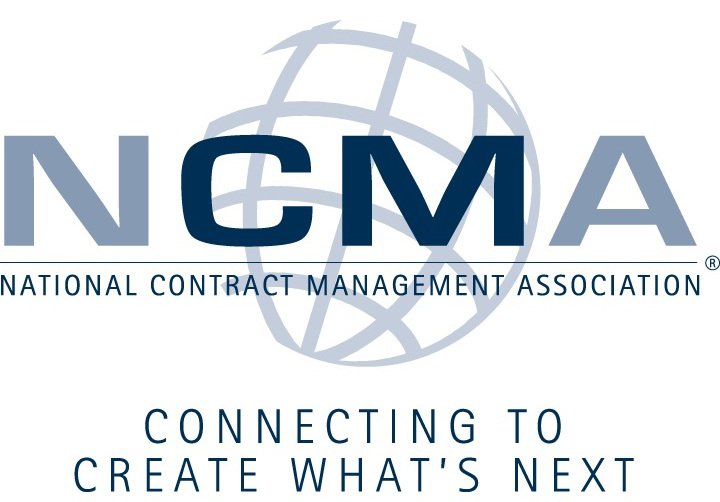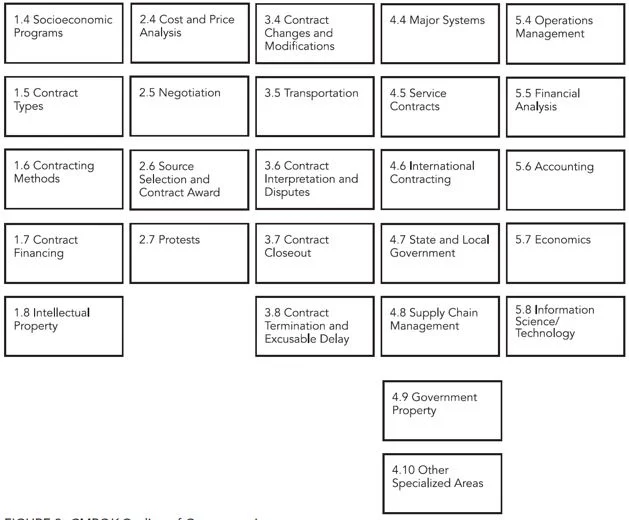A BRIEF OVERVIEW OF THE CONTRACT MANAGEMENT BODY OF KNOWLEDGE
/
BREIF OVERVIEW OF THE NCMA CMBOK
The National Contract Management Association (NCMA) can be a key reference point as you work your day-to-day job in contact / supply chain management. It offers resources and a collaborative environment that will help you in developing your contract management skill set.
One resource of NCMA is the Contract Management Body of Knowledge (CMBOK). The CMBOK is a framework, or systematic breakdown, of the major areas of contract / supply chain management and how they work together to create a holistic profession. Please review Diagram 1 below as it will the breakdown of the NCMA CMBOK into its key components:
DIAGRAM 1. NCMA CMBOK
You’ll notice the CMBOK goes thru the three key stages of the contract lifecycle and includes two sets of allied activities. The three key stages of the contract lifecycle are:
Preaward: Here the buyer identifies the applicable regulations, key contracts principles, any applicable socio-economic programs, appropriate contract type for the risk(s) involved, methods of contracting, any contract financing, and intellectual property.
Acquisition: At this state the buyer surveys the marketplace to determine potential respondents, develops the solicitation, the seller responds to solicitations with valid proposals, a source selection is completed, an award is made and any protests are resolved
Post-Award: Activity at this level involves execution of the contractual agreement between the parties. Activities include contract management, quality assurance, contract change management, resolving interpretation and disputes, contract fulfilment, closeout and, if applicable, terminations or excusable delays are resolved. Arguably this is the “meat and potatoes” of our field of contract management.
The two allied activities in support of the contract lifecycle are Specialized Knowledge and Business Acumen. Under Specialized Knowledge we find different contract actions that need to be considered such as:
Research and Development activities,
Architects and constructions services,
Service contracts,
International contracts (which have unique terms and conditions which can differ significantly from domestic DoD contracts), and
Property management
Lastly, within the area of Business Acumen, we find areas that a contracts / supply chain manager need to excel in, including:
Business management: the understanding and interrelationships of people, processes, internal and external politics, and stakeholder interests that impact contract execution,
Leadership skills: the deft ability to handle the “soft” issues that inevitably arise during the course of contract execution,
Marketing and Business Development: the ability to continually look for win-win business relationships in partnership with the business development manager on the program to exploit potential new business opportunities as they arise,
Accounting and Finance: being able to understand the financial contribution each contract is making to the overall business base, being able to understand and influence EVMS metrics, and able to speak fluently in the language of finance that drives all business transactions, and
Science and Technology: although contracts managers are not engineers, it is good to have a rudimentary understanding the product or service being offered or, at minimum, knowing the appropriate program personnel to consult to ensure the offerings being made are within the domain of the organization, or sufficient risk mitigation is scoped in the contract to mitigate (as best as possible) negative outcomes on new work.
The CMBOK, if reviewed regularly, gives a good background of the basic steps of contract formation, execution, and completion. And it gives a good idea of the allied activities that we need to be continually attentive to as we work contract management issues.
The CFCM certification is based on these key process steps discussed above. Becoming certified shows that you have a solid understanding of the contract management process, as defined in the CMBOK. Whether you get certified or not, it is not a bad idea to take time, periodically, to review this and ask yourself, “In which areas am I weakest and how can I improve in that area?” In doing so, you will become a better, and more valued contracts / supply chain manager to the organization.
More information about the CMBOK can be found on the NCMA website at www.ncmahq.org.



